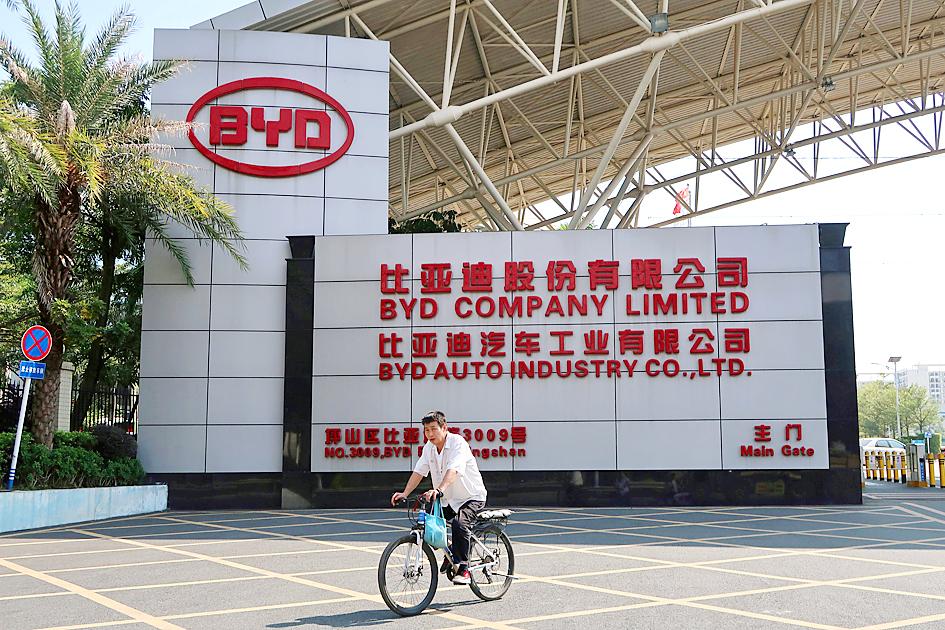BYD Co (比亞迪), the Chinese automaker backed by Warren Buffett, has come under fire for pollution at one of its factories that residents say has caused nosebleeds in hundreds of children.
Officials in Changsha, the capital of Hunan Province, sent a team to BYD’s factory to investigate gas emissions after receiving complaints from neighbors, the local government said in a statement on its Sina Weibo account on Sunday.
The team includes third-party testing institutions and experts who are to try to get to the bottom of the issue that has seen scores of parents in Changsha protest.

Photo: Reuters
One report said that more than 600 children living near the production plant in the city’s Yuhua District have experienced repeated nosebleeds since last month.
Shenzhen-based BYD said over the weekend that its emissions comply with regulations, adding that it has taken steps to reduce the odor caused by the plant, which has been in operation since 2012.
BYD also said that it has filed police reports alleging the complaints about nosebleeds are groundless and malicious.
The company’s China-traded shares yesterday dropped, falling as much as 4.6 percent, their biggest intraday decline in almost two weeks. Markets in Hong Kong, where BYD is also listed, are closed for a public holiday.
The stock, along with battery maker Contemporary Amperex Technology Co (新能源科技), was among the biggest drags on the CSI 300 index.
BYD is one of China’s most successful vehicle companies in terms of sales, producing both conventional gas automobiles as well as electric vehicles, for which it also makes batteries.

POWERING UP: PSUs for AI servers made up about 50% of Delta’s total server PSU revenue during the first three quarters of last year, the company said Power supply and electronic components maker Delta Electronics Inc (台達電) reported record-high revenue of NT$161.61 billion (US$5.11 billion) for last quarter and said it remains positive about this quarter. Last quarter’s figure was up 7.6 percent from the previous quarter and 41.51 percent higher than a year earlier, and largely in line with Yuanta Securities Investment Consulting Co’s (元大投顧) forecast of NT$160 billion. Delta’s annual revenue last year rose 31.76 percent year-on-year to NT$554.89 billion, also a record high for the company. Its strong performance reflected continued demand for high-performance power solutions and advanced liquid-cooling products used in artificial intelligence (AI) data centers,

SIZE MATTERS: TSMC started phasing out 8-inch wafer production last year, while Samsung is more aggressively retiring 8-inch capacity, TrendForce said Chipmakers are expected to raise prices of 8-inch wafers by up to 20 percent this year on concern over supply constraints as major contract chipmakers Taiwan Semiconductor Manufacturing Co (TSMC, 台積電) and Samsung Electronics Co gradually retire less advanced wafer capacity, TrendForce Corp (集邦科技) said yesterday. It is the first significant across-the-board price hike since a global semiconductor correction in 2023, the Taipei-based market researcher said in a report. Global 8-inch wafer capacity slid 0.3 percent year-on-year last year, although 8-inch wafer prices still hovered at relatively stable levels throughout the year, TrendForce said. The downward trend is expected to continue this year,

‘BASICALLY A BAN’: Sources said the wording governing H200 imports from officials was severe, but added that the regulations might change if the situation evolves Chinese customs authorities told customs agents this week that Nvidia Corp’s H200 artificial intelligence (AI) chips are not permitted to enter China, three people briefed on the matter said. Chinese government officials also summoned domestic technology companies to meetings on Tuesday, at which they were explicitly instructed not to purchase the chips unless necessary, two of the people and a third source said. “The wording from the officials is so severe that it is basically a ban for now, though this might change in the future should things evolve,” one of the people said. The H200, Nvidia’s second-most powerful AI chip, is one

A proposed billionaires’ tax in California has ignited a political uproar in Silicon Valley, with tech titans threatening to leave the state while California Governor Gavin Newsom of the Democratic Party maneuvers to defeat a levy that he fears would lead to an exodus of wealth. A technology mecca, California has more billionaires than any other US state — a few hundred, by some estimates. About half its personal income tax revenue, a financial backbone in the nearly US$350 billion budget, comes from the top 1 percent of earners. A large healthcare union is attempting to place a proposal before